GOOD FRIDAY — Morning Service
IN REMEMBRANCE OF THE PASSION AND DEATH OF OUR LORD JESUS CHRIST
(Saint Matthew 26:30-35; Saint Mark 14:26-31; Saint Luke 22:39; Saint John 18:1) (Saint Matthew 26:36-46; Saint Mark 14:32-42; Saint Luke 22:40-46; Saint John 18:1) (Saint Matthew 26:47-50; Saint Mark 14:43-45; Saint Luke 22:47-48; Saint John 18:31) (Saint Matthew 26:50-56; Saint Mark 14:46-52; Saint Luke 22:49-53; Saint John 18:4-12) (Saint Matthew 26:57-58; Saint Mark 14:53-54; Saint Luke 22:54; Saint John 18:13-16, 19-24) (Saint Matthew 26:59-66; Saint Mark 14:53, 55-64) (Saint Matthew 26:58, 69- 75; Saint Mark 14:54, 66- 72; Saint Luke 22:55-62; Saint John 18:17-18, 25-27) (Saint Matthew 26:67-68; Saint Mark 14:65; Saint Luke 22:63-65) (Saint Matthew 27:1; Saint Mark 15:1; Saint Luke 22:66-71) (Saint Matthew 27:3-10) (Saint Matthew 27:2, 11-14; Saint Mark 15:1-5; Saint Luke 23:1-4; Saint John 18:28-38) (Saint Luke 23:5-12) (Saint Matthew 27:15-23, 26; Saint Mark 15:6-15; Saint Luke 23:13-25; Saint John 18:39-40) (Saint Matthew 27:26-30; Saint Mark 15:15-19; Saint Luke 23:24-25; Saint John 19:1-3) (Saint Mark 15:16-19; Saint John 19:4-11) (Saint Matthew 27:24-25, 31; Saint Mark 15:20; Saint John 19:12-16) (Saint Matthew 27:32-34; Saint Mark 15:21-23; Saint Luke 23:26-33; Saint John 19:17) (Saint Matthew 27:35-50; Saint Mark 15:25-37; Saint Luke 23:33-46; Saint John 19:18-30) (Saint Matthew 27:51-56; Saint Mark 15:38-41; Saint Luke 23:45-49) (Saint John 19:31-37) (Saint Matthew 27:57-61; Saint Mark 15:42-47; Saint Luke 23:50-56; Saint John 19:38-42)
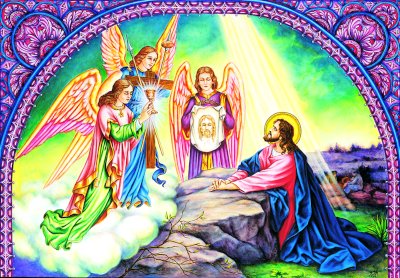
Reading of the Holy Gospel
THE PASSION OF OUR LORD JESUS CHRIST
I. — FROM THE CENACLE TO GETHSEMANI
After these words, Jesus recited the hymn of thanksgiving; then He went out and, according to His custom, He directed His steps across Cedron Brook toward the Mount of Olives. His Disciples followed Him. Jesus said to them:
"This very night, you will be scandalized because of Me, and all of you will fall, for it is written: 'I shall strike the Shepherd, and the sheep of the flock will be scattered.' But after I have risen, I will go before you into Galilee.''
Peter protested, saying:
"Even though everyone might be scandalized because of You, I will never be scandalized!"
"This very night," replied Jesus, "before the cock crows twice, you will have denied Me three times. I declare it to you in truth.''
But Peter protested even more energetically:
"Even if I had to die with You, I will never deny You!"
And the others all said the same thing.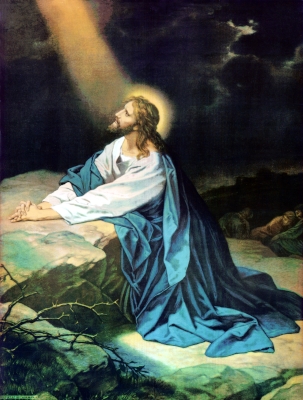
II. — GETHSEMANI
At the foot of the Mount of Olives there was a country house, with a garden called Gethsemani. Jesus entered it with His Disciples. Since He went there often to pray with them, the place was known by Judas, who betrayed Him. Jesus then said to His Disciples:
"Sit down here, while I go a little further to pray. And you pray also, so that you may not yield to temptation."
He took with Him only Peter and the two sons of Zebedee, James and John; and He began to be filled with dread and revulsion, sorrow and anguish.
"My soul is sorrowful even unto death," He said; "wait here and watch with Me."
Then He went off about a stone's throw from them, and, kneeling down with His face to the ground, He prayed so that, if it were possible, He might be spared from the coming hour.
"Father," He said, "if it is possible, and everything is possible to Thee, take this cup from Me! Yet, Thy Will be done, and not Mine!"
He interrupted His prayer and went to His Disciples; He found them asleep, overwhelmed by sorrow.
"Simon, you are sleeping!" He said to Peter.
Then He spoke to the other two: "So then, could you not watch one hour with Me?... Get up, watch and pray, so as not to enter into temptation; for the spirit is willing, but the flesh is weak."
Again He went off and took up the same prayer: "Father, if this cup cannot go away unless I drink it, Thy Will be done!"
He returned once more to His Disciples: He found them still sleeping; their eyes were weighed down by sleep and they had no idea what answer they gave Him.
Leaving them, He went and prayed for the third time, repeating the same words:
"Father, if Thou art willing, take this cup from Me! But let not My Will be done, but Thine!"
He had fallen into agony and His prayer became more and more earnest. Sweat poured from Him as drops of blood, running down on the ground. Then an Angel, come from heaven, appeared to Him and strengthened Him.
He returned to His Disciples a third time. "Sleep now," He told them, "and take your rest… But enough, the hour has come! The Son of Man is going to be betrayed into the hands of sinners… Come now, get up! The one who is to betray Me is corning!"III. — THE TRAITOR
He was still speaking when Judas Iscariot, one of the Twelve, arrived. He was accompanied by a cohort. With them, the Chief Priests, Pharisees, Scribes and Elders of the people had sent their attendants with lanterns, torches and weapons. All around them surged a huge mob, armed with swords and clubs.
Now the traitor had given them this sign: "Whoever I kiss, He is the one! Lay hold of Him and take your precautions to lead Him away."
Thus Judas advanced at the head of the cohort, went suddenly up to Jesus and said: "Greetings, Master!" And He kissed Him ...
"Friend," said Jesus, "what have you come here to do?... Judas, you betray the Son of Man with a kiss!"IV. — THE ARREST
Jesus, knowing all that was going to happen to Him, stood before the attendants and asked them:
"Whom do you seek?"
"Jesus of Nazareth!" they cried.
He answered:
"I am He!"
Judas, who betrayed Him, was standing among them. As soon as Jesus told them, "I am He," they recoiled and fell down upon their backs.
Again Jesus asked them:
"Whom do you seek?"
"Jesus of Nazareth!" they replied.
"I told you, I am He!" answered Jesus. "Since I am the one you seek, let these men go."
Thus were the words He had spoken fulfilled: "Of those Thou hast given Me, not one of them has perished."
The men of the cohort came up at once, laid hold of Jesus and arrested Him.
Seeing what was about to happen, those around Him cried out: "Lord, shall we strike with the sword?"
And without waiting for an answer, Simon Peter, who had a sword, drew it out of his scabbard, struck a servant of the High Priest and cut off his right ear. This servant's name was Malchus.
"Let that man come here," said Jesus. And He touched his ear and healed it.
Jesus then said to Peter: "Put your sword back in its scabbard, for everyone who takes up the sword shall perish by the sword... Shall I not drink the cup My Father has given Me? Do you not realize that if I asked My Father, He would send Me more than twelve legions of Angels at once?... But then how would the Scriptures, which say that it must be so, be fulfilled?"
Then He turned to the mob, with the Chief Priests, Temple Guards and Elders in its midst.
"You have come out to arrest Me with swords and clubs as though I were a bandit," He told them. "Yet I sat among you daily, teaching in the Temple, and you never laid a hand on Me. But now this is your hour, this is the hour of the power of darkness.
"Now all of this has happened to fulfill what is written in the Prophets."
Then the men of the cohort, their Commander and the attendants of the Jews fell upon Jesus and bound Him.
At that moment, His Disciples, all at once, abandoned Him and ran away. A young man who was there, covered only with a cloth, wanted to follow Jesus; the attendants laid hold of him, but leaving the cloth in their hands, he escaped.V. — JESUS BEFORE ANNAS
They brought Jesus first to Annas, who was the father-in-law of Caiphas, the High Priest that year.
Simon Peter had followed Jesus at a distance, along with another Disciple. That other Disciple, who was known by the High Priest, had entered the palace courtyard with Jesus. Peter had remained outdoors, standing by the gate. The Disciple known by the High Priest then went out, spoke to the portress and had him brought in.
The High Priest questioned Jesus on His Disciples and on His Doctrine.
"I have spoken publicly to the world," replied Jesus. "I have always taught in the synagogues and in the Temple, where all the Jews congregate, and I have said nothing in secret. Why are you questioning Me? Question those who have heard Me; they know what I have said."
With this reply, one of the attendants on duty struck Jesus and shouted at Him:
"Is that any way for You to talk to the High Priest?"
"If I have spoken badly, show Me where I was wrong," answered Jesus; "but if I have spoken well, why hit Me?"
Annas ordered Jesus to be led in chains to Caiphas, the High Priest. He was the one who had given this counsel to the Jews: "It is expedient for one man to die for the people."VI. — JESUS BEFORE CAIPHAS
All the Priests and Elders of the people were assembled in the house of Caiphas.
Now the Chief Priests and all the Sanhedrin were seeking false testimony against Jesus in order to put Him to death, and they could not find any. Several, it is true, had perjured themselves; but their testimonies were contradictory. The two last ones who came forward testified thus:
"We heard Him say, 'I will destroy this Temple, built by the hand of men, and in three days I will build another one, which will not be made by the hand of men.' " Yet their evidence did not coincide.
Then the High Priest, rising in the midst of the assembly, wanted to question Jesus himself.
"Have You no answer to give concerning the things these men have testified against You?" he asked.
Jesus kept silence and made no reply.
The High Priest then asked Him this question:
"Are You the Christ, the Son of the blessed God? Tell us! I command You by the living God!"
"You have said it, I am!" answered Jesus. "And I declare to you: one day you will see the Son of Man sitting at the right hand of the Power of God and coming upon the clouds of heaven."
Then the High Priest tore his garments and cried out:
"He has blasphemed! What further need do we have of witnesses?... You have heard the blasphemy! What do you think of it?"
And they all answered:
"He is liable to death!"VII. — PETER'S DENIAL
It was cold. The attendants and servants had lit a fire in the center of the courtyard and were huddling around it to get warm, some of them sitting, some standing. Peter sat among them, warming
himself, waiting for the outcome of the case. The portress, a maidservant of the High Priest, came over. Noticing the Apostle who was warming himself, she approached him and looked at him carefully.
"Here is one of those who was with the Nazarene," she said. Then, peering into his face, she repeated: "Yes, you were with Jesus of Galilee!"
Peter denied it in front of everyone:
"Woman, I do not know Him! I don't know... I cannot understand what you are saying!"
Then he left the courtyard, directing his steps toward the vestibule; but as he arrived there, another maidservant noticed him and cried out to the attendants:
"This man was certainly with Jesus of Nazareth!"
A moment later, another servant encountered him and said:
"And you too, aren't you one of them?"
At that moment the cock crowed. Peter returned to the fire, standing and warming himself.
"Weren't you one of His Disciples?" the attendants asked him.
He denied it a second time, making an oath:
"No, I tell you, no! I do not know that man at all!"
About an hour later, those who were there said to him:
"Surely you are a member of that group, since you are from Galilee:· your accent gives you away!"
One of the High Priest's attendants, a relative of the man whose ear Peter had cut off, accused him also:
"Didn't I see you in the garden with Him?"
Peter denied it again, and he began swearing, multiplying oaths.and protestations:
"No," he repeated, "I do not know the man! I don't know what you mean!"
And the cock crowed for the second time. Jesus passed by at that very moment; He turned toward Peter and rested His gaze upon him. Then Peter recalled that the Lord had said to him, "Before the cock crows twice, you will deny Me three times." He went out, and once he was outside, he began weeping bitter tears.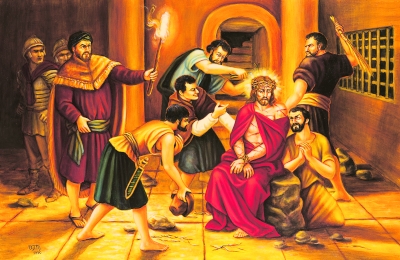
VIII. — INSULTS OF THE SERVANTS AND ATTENDANTS
And Jesus was taken to the prison for condemned men.
Now those who were charged with guarding Him began making a game out of beating Him. They spat in His face, they blindfolded Him and kept hitting Him; saying:
"Christ, guess who struck Thee!"
They subjected Him to all kinds of insults, reviling Him with loathsome blasphemies.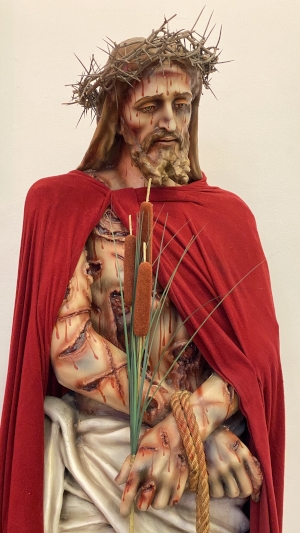
GOOD FRIDAY
IX. — JESUS BEFORE THE SANHEDRIN
At daybreak, all the members of the Sanhedrin - High Priests, Scribes and Elders of the people - assembled in great haste and called Jesus before them, to have Him put to death. They said to Him:
"If You are the Christ, then declare it to us!"
"If I tell you, you will not believe Me," replied Jesus. "And if I question you, you will not answer Me, nor will you set Me free. And yet, henceforth, the Son of Man will be seated at the right hand of the Power of God."
And they all asked together:
"So You are the Son of God?"
"You have said it, I am!" answered Jesus.
Then they cried out:
"What further need do we have of witnesses? We have just heard it from His own mouth!"X. — REMORSE AND SUICIDE OF THE TRAITOR
Seeing that Jesus had been condemned, Judas, the traitor, driven by remorse, returned the thirty pieces of silver to the Chief Priests and Elders.
"I have sinned in betraying the blood of the Just Man!" he said.
"What is it to us? That is your business!"
With that, Judas threw the silver coins into the Temple, went out and hanged himself.
The Chief Priests picked up the money.
"It is not permitted to put it in the Treasury," they said, "for it is the price of blood."
Later, after deliberating over it, they purchased a potter's field with this sum as a burial place for strangers. That is why this field is called in their language Haceldama: the Field of Blood, a name that has remained to this day.
Thus were the words of the Prophet fulfilled: "They took the thirty pieces of silver, the price the children of Israel valued Him, the One on whom they set a price. And they gave them for a potter's field, as the Lord showed me."XI. — JESUS BEFORE PILATE
As soon as Jesus declared that He was the Son of God, all the members of the Sanhedrin rose together, had Him bound and led away to be handed over to the governor, Pontius Pilate.
It was still early morning. The Jews did not enter the pretorium, for fear of contracting a legal defilement and of not being able to eat the Passover. So Pilate came out to them on the threshold of his pretorium; he asked them:
"What accusation do you make against this man?"
They replied:
"If He were not a criminal, we would not have handed Him over to you."
"Take Him yourselves, then," said Pilate, "and judge Him according to your Law."
"It is no longer permitted for us to give the death penalty to anyone," retorted the Jews.
Indeed, this was so that the words of Jesus might be fulfilled, indicating the way He was to die.
And the Jews began formulating their accusations:
"We have found this man disrupting our nation, forbidding the payment of tribute to Caesar and claiming the title of Christ the King!"
Pilate returned to the pretorium and had Jesus brought in, having Him stand before him.
"Are You the King of the Jews?" he asked Him.
"Do you speak for yourself," said Jesus, "or according to what others have told you about Me?"
"Am I a Jew?" replied Pilate. "Your nation, Your priests have brought You before my court. What have You done?"
"My royalty does not come from this world," answered Jesus. "If My royalty came from this world, My men would not have failed to fight so that I would not fall into the hands of the Jews. No, for the present time, My Kingdom is not from here."
"You are a King, then?" Pilate asked.
"You have said it, I am a King!... I was born, I have come into this world to bear witness to the Truth. Whoever is on the side of the Truth hears My voice."
"What is the truth?" said the governor.
And with this question, he returned outside to the Chief Priests and the crowd of Jews and said to them:
"I find in this man no evidence for condemnation."
Then the Chief Priests and Elders multiplied their accusations: Jesus remained silent.
''Don't You hear all these things they are accusing You of?" exclaimed Pilate. "Have You no answer to give?"
But Jesus said not even a single word to him, leaving the governor deeply perplexed.XII. — JESUS BEFORE HEROD
Meanwhile the Jews wete insisting vehemently, and crying out:
"He has been stirring up the people with the doctrines He is spreading, from Galilee where He started, and all through Judea, and even up to here!"
Pilate, hearing the name of Galilee, asked if this man were a Galilean. Upon learning that Jesus belonged to Herod's jurisdiction, he sent Him to that king, who was in Jerusalem at the time.
Herod, upon seeing Jesus, felt deep satisfaction. He had been wanting to know Him for a long time, because of all he had heard about Him, and because he was hoping to see Him perform some wonder. So he began asking Him a whole host of questions. Jesus answered nothing.
And the Chief Priests and Scribes were standing there, accusing Him without letup.
Herod and his guards covered Jesus with contempt. He had Him decked out in a white robe and made fun of Him. Then he sent Him back to Pilate. And, from that day, Herod and Pilate became friends, although they had been enemies before.XIII. — BARABBAS
Pilate called in the Chief Priests, the rulers and the people, and he spoke these words to them:
"You have brought this man before me, as someone who is stirring up the nation; yet I have questioned Him in your presence, and I have found in Him no grounds for condemnation on the counts you accuse Him of. Neither has Herod, to whom I sent you. Therefore, no evidence has been established against Him that is deserving of death. For this reason, I will have a chastisement inflicted upon Him and then release Him."
Now, it was customary, on the day of the feast, for the governor to grant them the release of a prisoner, designated by them. There was a notorious criminal, called Barabbas, in prison at the time. He was chained up with the rebels, for having killed a man during a revolt. At that moment, the people came to the pretorium and demanded the pardon that the governor always granted. Having the crowd draw closer, Pilate said to them:
"It is the custom for me to release a prisoner to you at the Passover feast. Do you want me to release the King of the Jews?... Which one do you prefer, Barabbas or Jesus, who is called the Christ?"
Indeed, he knew very well that the Priests had delivered Hirn only out of envy.
Meanwhile, his wife sent word to him, as he sat on the judgment seat: "Do not commit yourself in the case of this Just Man, for today I have suffered strange things in a dream concerning Hirn."
But the Chief Priests and Elders had agitated the people, and they had excited them to demand the release of Barabbas and the death of Jesus.
Thus, when the governor renewed his question:
"Which of these two do you want me to release to you?"
The crowd thundered unanimously:
"Barabbas! Not this man, but Barabbas!"
"But what am I to do with Jesus, this King of the Jews, called the Christ?" replied Pilate.
They all cried louder than ever:
"Let Him be crucified!"
"But why, what evil has He done?" insisted the governor.
The Jews shouted louder and louder:
"Let Him be crucified!"
Pilate had decided to release Jesus. He spoke to them once again. But the outcry grew more and more violent:
"Crucify Him! Crucify Him!"
He asked them a third time:
"What evil has He done? I find. nothing in Him that is deserving of death: so I will chastise Him, and then I will release Him."
But they insisted and demanded, with loud cries, that He be crucified, and their cries grew more and more threatening. Therefore Pilate, wishing to satisfy the people, released Barabbas, the rebellious and murderous prisoner they demanded, and he delivered Jesus over to their will.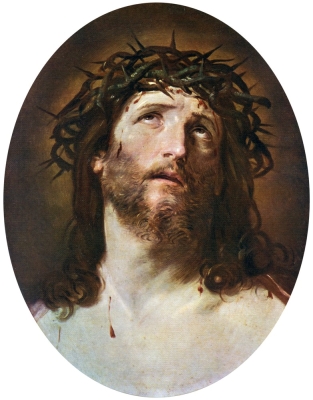
XIV. — THE SCOURGING AND THE CROWN OF THORNS
Pilate took Jesus and had Him scourged at first. Then the soldiers dragged Him into the pretorium courtyard, assembling the entire cohort around Him. Having stripped Him of His garments, they covered Him with ·a scarlet cloak. Then they plaited a crown of thorns and thrust it down upon His head. In His right hand they placed a reed. And then, genuflecting before Him mockingly, they jeered at Him, saying:
"Hail, King of the Jews!"
They struck Him, spat in His face and, taking the reed, they hit Him repeatedly over the head with it.XV. — ECCE HOMO
When the Roman soldiers had finished amusing themselves with Jesus, they led Him to the pretorium. Pilate went outside again and said to the people:
"You see, I am bringing Him out to you once more; so you may know that I find in Him no grounds for condemnation."
And Jesus came out, wearing the crown of thorns and covered with the scarlet cloak.
"Behold the Man!" said Pilate.
As soon as they saw Him, the Chief Priests and their attendants cried out:
"Crucify Him! Crucify Him!"
"Take Him, then, and crucify Him yourselves!" shouted Pilate. "As for me, I find no guilt in Him."
"We have a Law," replied the Jews, "and according to our Law, He must die! For He is passing Himself off as the Son of God!"
At these words, Pilate was again filled with even greater dread. Returning to the pretorium, he asked Jesus:
"Where do You come from?"
Jesus gave him no answer.
"You won't speak to me?" said Pilate. "Don't You know that I have the power to have You crucified, and that I also have the power to release You?"
"You would have no power over Me if you had not received it from On High," answered Jesus. "And that is what aggravates the crime of the man who betrayed Me to you."XVI. — THE SENTENCE
More than ever, Pilate sought to release Jesus. But the Jews redoubled their shouts:
"If you release Him, you are no friend of Caesar's: for anyone who makes himself out to be a king sets himself against Caesar."
Pilate, hearing these cries, brought Jesus outside and sat on the judgment seat, at the place called Lithostrotos (stone dais) in Greek, and Gabbatha (terrace) in Hebrew. It was almost the sixth hour (noon) of the day before Passover.
Pilate said to the Jews:
"Behold your King!"
''Away with Him! Away with Him! Crucify Him!" they cried.
"What then," asked Pilate, "shall I crucify your King?"
The Chief Priests answered:
"We have no other king but Caesar!"
Seeing that he was getting nowhere and that the tumult was growing worse, Pilate had some water brought in and, washing his hands in view of the people, he said:
"I am innocent of the blood of this Just Man; you will answer for it!"
And all the people cried out:
"May His blood fall upon us and upon our children!"
So Pilate commanded that it be done according to the will of the Jews, and he delivered Jesus to them to be crucified. After making fun of Him again, the soldiers tore off the scarlet cloak, put His own garments on Him and led Him outside the city to crucify Him.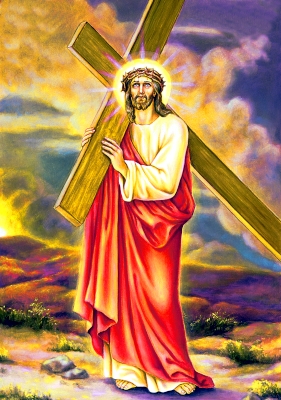
XVII. — THE WAY OF CALVARY
Carrying His cross, Jesus therefore set out for the place called Calvary, or Golgotha in Hebrew. Behind Him walked two criminals who were to receive the death penalty.
As the group was about to go out of the city, the soldiers came across a man called Simon of Cyrene, the father of Alexander and Rufus, who was returning from his farm. They requisitioned him, set the cross on his shoulders and forced him to carry it behind Jesus.
An immense crowd followed, including some women who were weeping and lamenting. Jesus turned to them and said:
"Daughters of Jerusalem, do not weep over Me; but weep over yourselves and your children. The days are coming when people will say, 'Blessed are the sterile! Blessed are the wombs that never conceived and the breasts that never nursed!' Then they will cry to the mountains, 'Fall upon us!' and to the hills, 'Bury us!' For if the green wood is treated this way, what shall it be for the dry?"
They came to Calvary: there He was given a cup of wine mingled with myrrh and gall. Jesus raised it
to His lips, but He refused to drink it.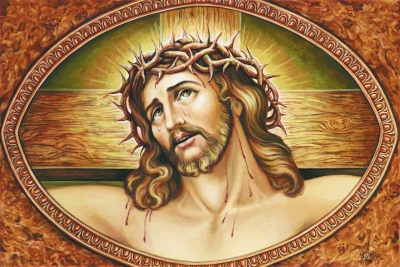
XVIII. — JESUS ON THE CROSS
Then they crucified Him... It was during the sixth hour. They crucified the two thieves with Him, one on His right, the other on His left, and Jesus in the middle.
Thus were these words of Scripture fulfilled:
"He was reckoned among the wicked."
Pilate himself had written the inscription indicating the grounds for the execution of Jesus; he had it placed atop the cross. It bore these words:
JESUS OF NAZARETH, KING OF THE JEWS
Many Jews read this inscription, for the place in which Jesus was crucified was near the city. It was written in three languages: Hebrew, Greek and Latin. The Chief Priests of the Jews had gone and protested to Pilate.
"Do not write, 'King of the Jews,'" they had told him, "but rather, 'This man claims to be the King of the Jews.'"
"What I have written, I have written!" Pilate had retorted.
And Jesus said:
"Father, forgive them, for they know not what they do!"
After they had crucified Him, the soldiers took His clothes and divided them into four parts, one for each. Since the robe was seamless, woven in one piece from top to bottom, they said to one another:
"Let's not tear it, but let us cast lots for it and see who it will belong to."
Thus were these words of Scripture fulfilled:
"They divided My garments among them, and for My vesture they cast lots."
That is what the soldiers did; then they sat down and kept watch over Him.
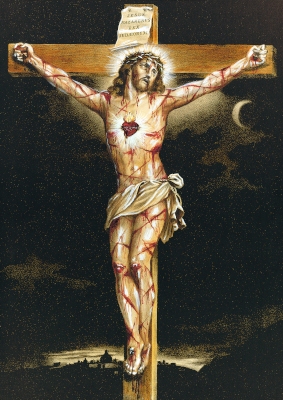
There was a great crowd of people all around, looking at Jesus and jeering at Him. The passers-by blasphemed Him also; they said to Him, wagging their heads:
"Ha! You, the One who destroys the Temple of God and rebuilds it in three days, save Yourself! If You are the Son of God, come down from the cross!"
The Chief Priests, scribes and Elders also railed at Him with mockery.
"He saved others," they said, "and He cannot save Himself! If He is the King of Israel, let Him come down from the cross now, and we will believe in Him! He put His trust in God: let God deliver Him now, if He loves Him. Did He not say, 'I am the Son of God'?"
The soldiers did not spare Him their insults either; they came up to the cross and offered Him some vinegar, saying to Him:
"Save Yourself, if You are the King of the Jews!"
Even the thieves . crucified with Him taunted Him with sarcasm. One of them went on blaspheming, saying:
"If You are the Christ, save Yourself! And us with You!"
Soon, however, the other thief reproached him strongly with these words:
"Have you no fear of God, seeing that you are under the same sentence? For us, this is justice; we are receiving the punishment we deserve for our crimes. But this man has done no wrong. Then, speaking to Jesus, he said:
"Lord, remember me when You have come into Your kingdom!"
Jesus answered him:
"Amen, I say to you: This very day you will be with Me in Paradise."
Standing by the cross were His Mother, and His Mother's sister, Mary, the wife of Cleophas, and Mary Magdalen. Jesus looked at His Mother and, standing by Her, the Disciple He loved, and He said to His Mother:
"Woman, behold Thy son!"
Then he said to the Disciple:
"Behold thy Mother!"
And from then on, the Disciple considered Her as his Mother. It was during the sixth hour that Jesus was crucified; and from the sixth to the ninth (three o'clock), darkness covered the whole world. The sun had lost all its light.
Toward the ninth hour, Jesus cried out in a heartrending voice:
"Eli, Eli, lamma sabacthani?"
Which means:
"My God, My God, why hast Thou abandoned Me?"
"Look, He is calling Elias!" said some of the bystanders.
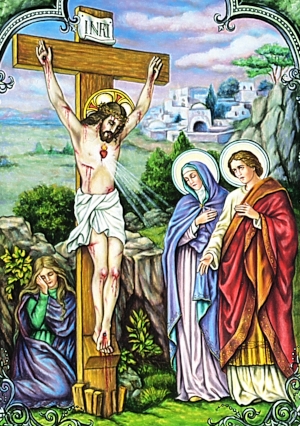
Seeing that all the words of the Prophets had been fulfilled, Jesus accomplished the final one. He said:
"I thirst!"
There was a container full of vinegar there. One of the guards ran to get a sponge, soaked it in the vinegar and, setting it on a stalk of hyssop, lifted it up to Jesus' lips.
The others said:
"Stop! Let us see whether Elias comes to save Him."
"Stop, yourselves!" replied the one who offered Him the vinegar. "This is precisely to see whether Elias will come and take Hirn down from the cross!"
Jesus sipped the vinegar and said:
"All is consummated!"
Then He cried out in a loud voice:
"Father, into Thy hands I commend My spirit!"
Upon speaking these words, He bowed His head, and He breathed His last...
(Pause during a few seconds) XIX. — WONDERS FOLLOWING THE DEATH OF JESUS - THE HOLY WOMEN
Suddenly, the Temple curtain was torn down the middle, from top to bottom; the earth quaked, rocks split, sepulchers opened, and many bodies of saints who had died rose. Resurrected, they emerged from their tombs, entered the Holy City and appeared to many people.
The Centurion who stood facing the cross, hearing Jesus' mighty cry the moment He expired, and seeing all that was happening, gave glory to God and exclaimed:
"This Man was truly the Son of God!"
And those who kept guard over Jesus with him, filled with dread at the sight of the earthquake and the other wonders, also cried out:
"Yes, this man was a Just Man! He was truly the Son of God!"
And all the people who had gathered to see Jesus die returned to Jerusalem beating their breast. As for those who knew Jesus, they remained standing at a distance, looking on at all that was happening. The women who had followed Him from Galilee also looked on at a distance. Among them were Mary Magdalen, and Mary, the mother of James and Joseph, and Salome, who had accompanied and served Hirn when He was in Galilee. There were also many others who had come with Hirn to Jerusalem.XX. — CHRIST'S SIDE OPENED WITH THE LANCE
It was the day before the Sabbath. So that the bodies might not remain on the cross the following day, which was the most solemn Sabbath, the Jews asked Pilate to order that the condemned men's legs be broken and that their bodies be removed.
So the soldiers came and broke the legs of the first thief, and then of the other one who had been crucified with Him. When they came to Jesus, seeing that He was dead, they did not break His legs. With a lance, one of them opened His side, and at once blood and water came out.
The one who saw this bears witness to it, and his testimony is true, and he knows he is telling the truth, so that you also might believe.
Thus were these words of Scripture fulfilled: "Not a bone of Him shall you break," as well as these:
"They shall look upon Him whom they have pierced."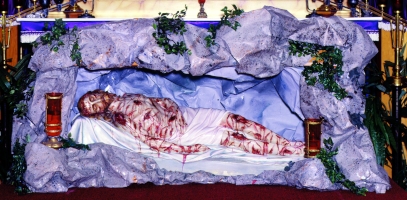
XXI. — THE DESCENT FROM THE CROSS AND THE BURIAL
Joseph, a rich man of Arimathea, a city in Judea, arrived toward evening. He was a good and just man, who also awaited the Kingdom of God, for he was a Disciple of Jesus, although in secret, for fear of the Jews. A highly-esteemed decurion, he had not consented to either the plots or actions of the others.
He had gone directly to Pilate, and he had boldly asked for the body of Jesus. Pilate, surprised that He had died so soon, had sent for the Centurion and asked him if Jesus were really already dead. When the Centurion replied that He was, he had ordered that the body be given to Joseph.
Nicodemus, the one who, from the beginning, had come to Jesus by night, had .also come, bringing a mixture of myrrh and aloes weighing about a hundred pounds.
Joseph, who had purchased a fine linen shroud, took Jesus down from the cross; then they both covered Him with the shroud, wrapped Him in perfumed linen cloths and buried Him in the Jewish manner.
Near the place in which Jesus had been crucified there was a garden, and in this garden a tomb that belonged to Joseph. This sepulcher, hewn out of the rock, was new, and it had never been used for anyone. Since the preparation day for the Solemn Sabbath was ending, and this sepulcher was close at hand, they laid the body of Jesus within it. Finally, they rolled a large stone over the entrance of the tomb and then left, for it was already twilight.
Sitting opposite the sepulcher, Mary Magdalen and Mary, the mother of Joseph, along with the women who had come from Galilee with Jesus, gazed at the tomb and saw the way in which the Lord's body had been placed.
Then they left, for the purpose of preparing spices and ointments; but, faithful to the Law, they remained at rest during the entire Sabbath Day.